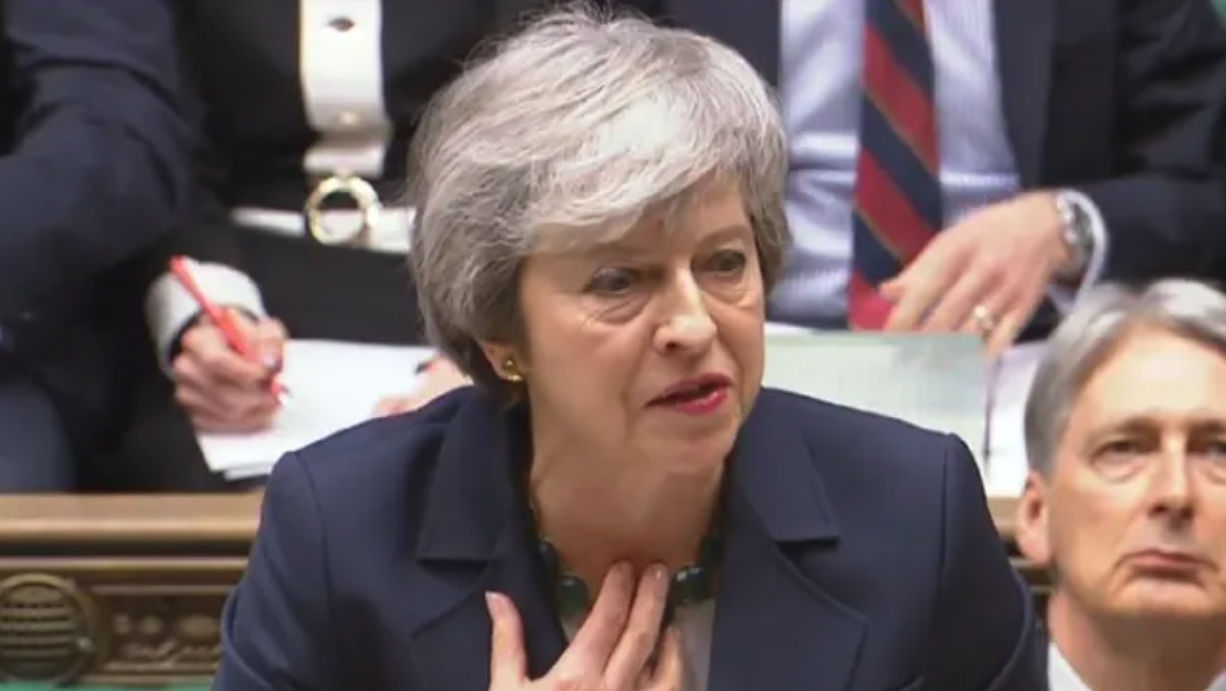Brexit: what is a free vote and why is Theresa May allowing one?
Labour claims prime minister ‘has given up any pretence of leading the country’

A free daily email with the biggest news stories of the day – and the best features from TheWeek.com
You are now subscribed
Your newsletter sign-up was successful
Tory MPs will get a free vote on a no-deal Brexit this evening.
Struggling with a sore throat, after a tough week in which her withdrawal deal was rejected for a second time by MPs, Theresa May today said she would be voting to rule out a no-deal exit on 29 March.
But Conservative ministers and MPs will be allowed to make up their own minds, “an unusual move for a vote on a major policy”, says the BBC.
The Week
Escape your echo chamber. Get the facts behind the news, plus analysis from multiple perspectives.

Sign up for The Week's Free Newsletters
From our morning news briefing to a weekly Good News Newsletter, get the best of The Week delivered directly to your inbox.
From our morning news briefing to a weekly Good News Newsletter, get the best of The Week delivered directly to your inbox.
So what is a free vote?
Each party appoints whips, whose job is to make sure the maximum number of MPs or lords vote in the Houses of Parliament - and vote the way that the party wants. Their job is even more important if the majority of the party in power is small, as with the current Tory government. A free vote, or unwhipped vote, is therefore one in which “MPs or members of the Lords are not put under pressure to vote a certain way by their party leaders”, explains Parliament.uk.
Why is today’s free vote unusual?
As a rule, free votes may be allowed for internal Commons decisions and for ethical issues that are seen as a matter of conscience, such as same-sex marriage, but rarely for issues “seen as central to political life”, says Philip Cowley, professor of politics at Queen Mary University of London.
A free daily email with the biggest news stories of the day – and the best features from TheWeek.com
In an article for The Times, he writes that today’s vote falls squarely into a third category - “issues where a free vote will get a party out of a hole”.
“To have whipped either for or against no deal would have provoked cabinet and other ministerial resignations. That is where its importance lies,” Cowley says.
A Labour Party spokesperson claimed the move shows that May “has given up any pretence of leading the country”.
Indeed, The Daily Telegraph adds: “While it is unlikely to change the overall result of the vote, with MPs expected to reject no deal, it is a sign of the prime minister’s diminished position.”
-
 Tourangelle-style pork with prunes recipe
Tourangelle-style pork with prunes recipeThe Week Recommends This traditional, rustic dish is a French classic
-
 The Epstein files: glimpses of a deeply disturbing world
The Epstein files: glimpses of a deeply disturbing worldIn the Spotlight Trove of released documents paint a picture of depravity and privilege in which men hold the cards, and women are powerless or peripheral
-
 Jeff Bezos: cutting the legs off The Washington Post
Jeff Bezos: cutting the legs off The Washington PostIn the Spotlight A stalwart of American journalism is a shadow of itself after swingeing cuts by its billionaire owner
-
 How corrupt is the UK?
How corrupt is the UK?The Explainer Decline in standards ‘risks becoming a defining feature of our political culture’ as Britain falls to lowest ever score on global index
-
 The high street: Britain’s next political battleground?
The high street: Britain’s next political battleground?In the Spotlight Mass closure of shops and influx of organised crime are fuelling voter anger, and offer an opening for Reform UK
-
 Biggest political break-ups and make-ups of 2025
Biggest political break-ups and make-ups of 2025The Explainer From Trump and Musk to the UK and the EU, Christmas wouldn’t be Christmas without a round-up of the year’s relationship drama
-
 ‘The menu’s other highlights smack of the surreal’
‘The menu’s other highlights smack of the surreal’Instant Opinion Opinion, comment and editorials of the day
-
 Is a Reform-Tory pact becoming more likely?
Is a Reform-Tory pact becoming more likely?Today’s Big Question Nigel Farage’s party is ahead in the polls but still falls well short of a Commons majority, while Conservatives are still losing MPs to Reform
-
 Taking the low road: why the SNP is still standing strong
Taking the low road: why the SNP is still standing strongTalking Point Party is on track for a fifth consecutive victory in May’s Holyrood election, despite controversies and plummeting support
-
 Is Britain turning into ‘Trump’s America’?
Is Britain turning into ‘Trump’s America’?Today’s Big Question Direction of UK politics reflects influence and funding from across the pond
-
 What difference will the 'historic' UK-Germany treaty make?
What difference will the 'historic' UK-Germany treaty make?Today's Big Question Europe's two biggest economies sign first treaty since WWII, underscoring 'triangle alliance' with France amid growing Russian threat and US distance